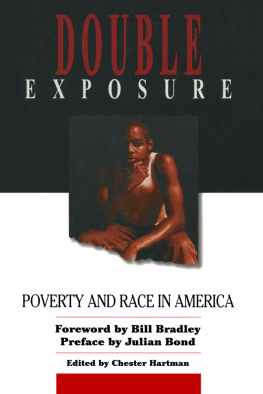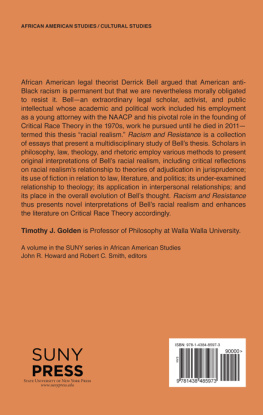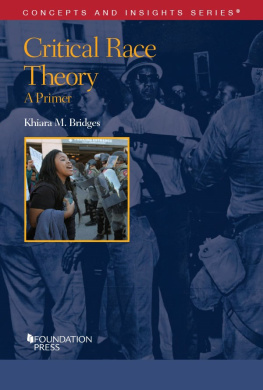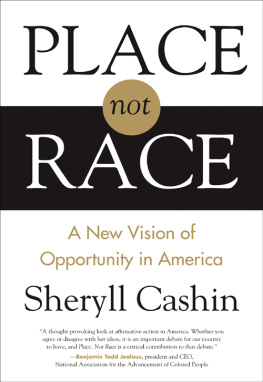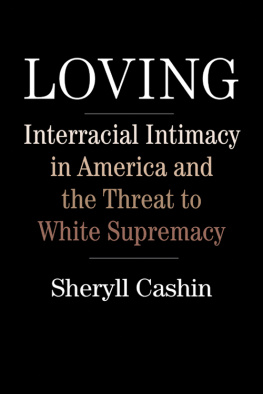DOUBLE EXPOSURE
Poverty & Race in America
DOUBLE EXPOSURE
Poverty & Race in America
Edited by Chester Hartman
Foreword by Bill Bradley
Preface by Julian Bond
First published 1997 by M.E. Sharpe
Published 2015 by Routledge
2 Park Square, Milton Park, Abingdon, Oxon OX14 4RN
711 Third Avenue, New York, NY 10017, USA
Routledge is an imprint of the Taylor & Francis Group, an informa business
Copyright 1997 Taylor & Francis. All rights reserved.
No part of this book may be reprinted or reproduced or utilized in any form or by any electronic, mechanical, or other means, now known or hereafter invented, including photocopying and recording, or in any information storage or retrieval system, without permission in writing from the publishers.
Notices
No responsibility is assumed by the publisher for any injury and/or damage to persons or property as a matter of products liability, negligence or otherwise, or from any use of operation of any methods, products, instructions or ideas contained in the material herein.
Practitioners and researchers must always rely on their own experience and knowledge in evaluating and using any information, methods, compounds, or experiments described herein. In using such information or methods they should be mindful of their own safety and the safety of others, including parties for whom they have a professional responsibility.
Product or corporate names may be trademarks or registered trademarks, and are used only for identification and explanation without intent to infringe.
Library of Congress Cataloging-in-Publication Data
Double exposure : poverty & race in America /
edited by Chester Hartman.
p. cm.
Includes index.
ISBN 1563249618 (hardcover : alk. paper).
ISBN 1563249626 (paperback : alk. paper)
1. RacismUnited States.
2. PovertyUnited States.
3. United StatesRace relations.
4. Afro-AmericansEconomic conditions.
I. Hartman, Chester W.
E185.615.D657
1996
305.800973dc20
9631314
CIP
ISBN 13: 9781563249624 (pbk)
ISBN 13: 9781563249617 (hbk)
Contents
Bill Bradley
Julian Bond
Chester Hartman
john a. powell
Howard Winant, S.M. Miller, John C. Brittain, Leslye E. Orloff, Paul Ong, Daniel Levitas, Jos Padilla, Bernardine Dohrn, john a. powell
Benjamin DeMott
Howard Winant
Lawrence Wright
Juanita Tamayo Lott
Samuel L. Myers, Jr.
Libero Della Plana
Ibrahim K. Sundiata
Ral Yzaguirre and Sonia M. Prez
Reynolds Farley
Nathan Glazer
john a. powell
Cathi Tactaquin
Robert Bach
Cathi Tactaquin
William R. Tamayo
Paul Ong and Abel Valenzuela, Jr.
David Hayes-Bautista, Werner Schink, and Gregory Rodriguez
Applied Research Center
Douglas S. Massey
Herbert J. Gans
World Hunger Year
World Hunger Year
Manning Marable
john a. powell
Henry Hampton
William L. Taylor
Roger Wilkins
Maxine Waters
The Economist
Brent Staples
Max Frankel
Charles Moskos
Salim Muwakkil
Fred Pincus
john a. powell, Sharon Parker, Theodore M. Shaw, Howard Winant, Richard America, David McReynolds, Kalonji Olusegun, Ronald Trosper, John Tateishi
Melvin L. Oliver and Thomas M. Shapiro
S.M Miller and Karen Marie Ferroggiaro
David Rusk
Margaret Weir, Eric Mann, John O. Calmore
World Hunger Year
Bill Bradley
Slavery was Americas original sin, and race remains its unresolved dilemma. For the past year, three Black males have dominated the nations focus on race. They are O.J. Simpson, Louis Farrakhan, and Colin Powell. Each in his own way fed Americas appetite to live vicariously, and to shrink from confronting, our racial reality. Each said something different about the state of race relations in America. They allowed white Americans to ridicule, demonize, or idealize Black Americans. The O.J. case revealed an almost irrevocable division between Blacks and whites, with the same disparate percentages of Blacks and whites feeling he was guilty before and after the trial. Louis Farrakhan allowed whites to attack the messenger rather than confront the part of his message about the desperate conditions in much of Black America. Colin Powell permitted white America to fantasize that an answer to our racial divisions amounted to no more than We like you; you do it for us.
The issue of race can never be a Black issue alonenot only because America is blessed by an abundance of Asian Americans, Latino Americans, and Native Americans, but also because a racial dialogue cannot take place without white Americans becoming full participants. White Americans have a race, too. Black separatists flourish where whites shut their doors to dialogue and assume no responsibility for their own stakes in racial healing.
The racial landscape of America seems full of land mines. Yet it is precisely at such moments of heightened awareness that we can make the greatest progress, because it is at those moments that the necessary pain of candor can be endured and then transcended.
So what is the state of Black-white relations in America? Both Black and white America are caught in a traumatic economic transformation in which millions of Americans feel insecure about their future, and for good reason. There are 130 million jobs in America, and 90 million of them involve repetitive tasks, which means that a computer can displace any of those jobholders. In a world where credit departments of three hundred people are routinely displaced by ten computer workstations, more and more Americans will lose good-paying jobs along with their health insurance and often their pensions, so that corporate profits can rise and productivity can increase. During the first six months of 1993, the Clinton administration announced that 1.3 million jobs had been created, to which a TWA machinist replied, Yeah, my wife and I have four of them. And indeed, over half of the newly created jobs were part-time.
If youre an African American, youve seen it before. In the 1940s the cotton gin pushed Black field hands off the farms of the South, to the cities of the North. Labor-intensive manufacturing jobs seemed to be the Promised Land. Then automation arrived, and the last hired were the first fired; millions of unskilled Black workers lost their jobs. Still, many hung on in the manufacturing sector. Then, with the advent of information technology and foreign competition, labor unions, such as the multiracial steelworkers, saw their membership plummet from 750,000 in 1979 to 374,000 in 1990. Finally, in the 1960s and 1970s, government began to employ African Americans in sizable numbers, but in the 1980s and 1990s, with the fiscal crunch in full progress, government employees were let go. In the midst of the information revolution, just as in the midst of any recession, tough economic winds become a hurricane for African Americans.

